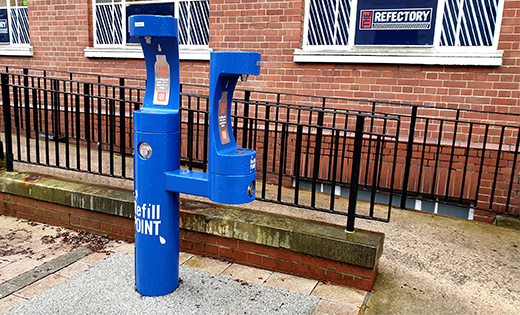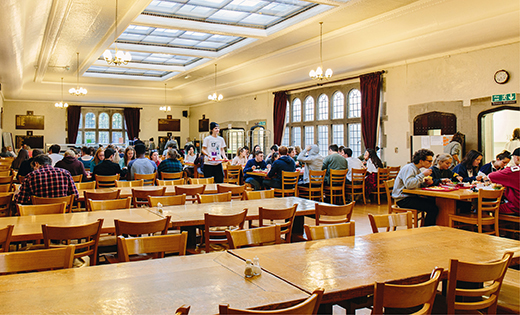Thanks a million!
One million pieces of single-use plastic have been removed from use across campus during the past 12 months.
Colleagues across the University have really taken the plastic-free pledge on and accomplished some brilliant things

One year on from the launch of the joint University and LUU pledge to go single-use plastic-free by 2023, we can already celebrate some notable successes.
Since making the headline announcement last November, we’ve been working hard behind the scenes to lay the groundwork for what is without question a complex challenge.
Some of the big wins to date include:
- Affine Café in Nexus was developed with the Plastic-Free Pledge in mind, removing single-use plastics from its fresh food preparation and presentation, only providing hot drinks in mugs and reusable cups and selling soft drinks in glass bottles or cans
- the Alumni and Development Team changed the wrapping on its annual magazine from plastic to sustainably-sourced paper, saving 230,000 plastic wrappers from being distributed worldwide
- Devonshire Hall catering team has replaced sauce and spread sachets with self-serve bowls at mealtimes, cutting out more than 86,000 items per year
- 22 teams across campus were awarded funding to reduce single-use plastic from their workspace, with a total of 222 mugs, 156 glasses, six water jugs and 96 water bottles provided
- Cohen Laboratory in the School of Earth and Environment changed its way of working to stop using single-use centrifuge racks in their labs, saving thousands of these items per year
- Estates installed an outdoor water fountain on the University Precinct, making free drinking water available 24/7
- Great Food At Leeds (GFAL) and LUU have replaced plastic salad containers with cardboard alternatives in The Refectory and Salad Box, cutting out 49,000 single-use plastic items
- staff in LUU have removed single-use plastic cups from all bars – equivalent to an estimated 63,000 cups per year
- Deli(very) has developed a recyclable cardboard alternative to the plastic trays for food deliveries, cutting the plastics figure by 500 items per week, which is due to increase by January when the project is fully rolled out
- milk deliveries have returned to campus, with a number of teams opting to use dairy deliveries in reusable glass bottles rather than plastic containers; and
- by buying your hot drinks in reusable cups at GFAL cafés and LUU shops, you’ve cut down on 79,876 disposable cups.
This is a fantastic achievement – colleagues across the University have really taken the plastic-free pledge on and accomplished some brilliant things.
 Estates has installed an outdoor water fountain on the University Precinct, making free drinking water available 24/7
Estates has installed an outdoor water fountain on the University Precinct, making free drinking water available 24/7
Mapping plastic use
But what does this one million figure mean in the context of the University’s overall plastics consumption?
The honest answer is we can’t be 100% sure at this stage. We started to map our single-use plastic consumption a year ago, and many of you helped by sending us stats and information from where you work. We had hoped it wouldn’t take so long, but in such a complex institution, there’s still some areas we need to assess before the whole picture becomes clear.
If you think you can supply information about single-use plastic in your area, including any solutions you’ve come up with, then please get in touch via the Single Out: 2023PlasticFree webpage.
Dr Louise Ellis, Director of Sustainability at Leeds, said: “It’s hard to believe it has been a year since we made the #2023plasticfree pledge.
“Some great progress has been made, but we know there are more challenges that lie ahead. The ambitious target was made to inspire activity amongst our staff and students, to drive bold operational changes and encourage the innovative research that is needed.
“To achieve this pledge and drive the changes necessary across the industry, we need everybody to support it and find alternatives, where possible.”
Sharing knowledge
Alongside all this work, we’ve also been making great networks and connections with people across campus and the wider city.
Examples include:
- developing the Leeds Anchors Plastics Network, which is a city-wide partnership group that works together to share knowledge and overcome single-use plastic challenges across the city – members include Leeds Beckett University, Leeds City Council, Yorkshire Ambulance Service, Yorkshire Water and the NHS
- speaking at conferences and discussing challenges and ideas with 35 other universities
- establishing a strategy for achieving the pledge, which identifies key areas of work and how they link together
- incorporating the removal of single-use plastics into 10 Blueprint plans for Schools and Services
- establishing internal networks between departments to ensure a cross-University approach to overcome challenging areas, including procurement and catering
- holding a workshop with 60 colleagues at the University’s Events Network, to establish action plans for removing single-use plastics from these events
- hosting 19 research projects across the University focusing on single-use plastic innovation, with a combined value of more than £6 million; and
- using student research capabilities to contribute to our plastics knowledge and data through the Leeds Living Lab – they have undertaken module projects, dissertations and held a plastics session during the Student Sustainability Research Conference.
 We’re focusing on catering and offices to make them single-use plastic free by the end of 2020
We’re focusing on catering and offices to make them single-use plastic free by the end of 2020
What’s planned for 2020?
Our main priorities during the next 12 months include:
- focusing on catering and offices to make them single-use plastic free by the end of 2020
- engaging with retail partners and suppliers to find innovative solutions to remove single-use plastic from their packaging
- working with procurement to understand our plastic footprint further, across all areas of the University; and
- promoting best practice and sharing knowledge to encourage further activity, both within the University and across the Leeds city region and the HE sector as a whole.
How can you help?
We need everyone’s support to achieve the 2023 target, and there are loads of ways you can get involved:
- review your work or study area to understand where single-use plastics are being used, and contribute to our mapping exercise (we have a template document available here for you to use)
- make a positive change; if you know of a solution to reduce or eradicate single-use plastic where you work or study, then please do it and tell us about it – use #2023PlasticFree on your social media posts
- become a Staff Sustainability Architect to help deliver plastic-focused sustainability projects specific to your area of work
- develop a Blueprint plan for your School/Service to progress a sustainability action specific to your area of work; and
- undertake research focused on single-use plastic solutions and innovation through your degree course or our Living Lab programme.
Visit the Sustainability webpage for more details about how you can get involved.
Posted in: University news